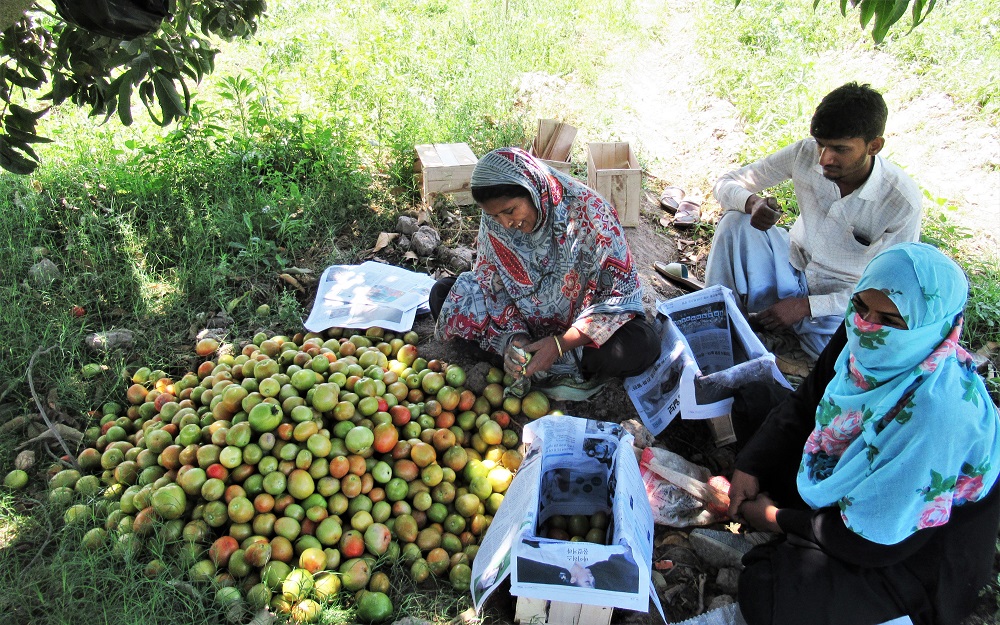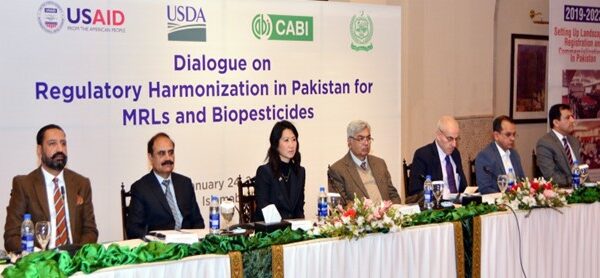
Tomato smallholder farmer Irshad Bibi has praised CABI’s postharvest training delivered in Pakistani village of Baili Janobi, District Muzaffargarh, which was aimed at improving ways of handling, packing and transporting the crop to market.
Members of CABI’s Strengthening Vegetable Value Chains in Pakistan (SVVCP) team gave hands-on training to 5 foundation farmers and 11 female labourers on ‘best practice’ ways of producing tomatoes which maximises yields and profits.
Tomato is just one perishable vegetable considered a key crop in Baili Janobi with wholesale markets in Peshawar and Islamabad being a target for them to sell their produce.
However, postharvest losses – caused by poor handling, packing and transportation – are hampering the farmers’ abilities to improve their livelihoods and local and regional food security.
The CABI team, as part of the SVVCP project funded by Australian Centre for International Agricultural Research (ACIAR), delivered training which, ultimately, will help farmers produce healthy and profitable tomatoes as well as onion, potato.
The project also serves to enhance the socioeconomic conditions of rural poor, particularly women in the Punjab and Sindh provinces.
Irshad Bibi said she harvested an average crop in the previous season and then lost a large proportion due to poor postharvest handling practices. This meant she had no choice but to sell her tomatoes at a reduced ‘give away’ price.
Like other farmers, she would be at the mercy of buyers who would take advantage of the perishability of tomatoes to pay less, forcing the farmers to accept poor returns on their labour and produce.
The lack of ‘best practice’ postharvest handling made tomato production an unprofitable venture for many smallholder farmers in district Muzaffargarh. But, after receiving the training from CABI, the tomatoes of smallholder farmers are fetching 25% more than the traditional tomatoes – which will ultimately increase smallholder farmers’ income.
Examples of enhanced postharvest handling to reduce the risk of damaged stock includes the use of plastic crates to shift the tomatoes from the field to the packing shed, a 13kg weight limit of goods packed in wooden crates for retail use and proper stacking of the crates during transportation to market.
“After adopting best practice postharvest operations, wastage has reduced and I am getting a premium price for my tomatoes in the market. I am now able to save more money to benefit my children,” she said.
In Pakistan, 84 percent of farmers are smallholders who rely on subsistence farming. CABI in Pakistan has been engaged with farmers since 1957 with a mission to increase crops yield, connecting farmers with the market and securing rural livelihoods by sharing environment friendly and audience centred knowledge.
The SVVCP project is working to maximize profit through improved crop management practices, better market linkages, rural entrepreneurship for community benefit and sustainable development of smallholder farmers.
Researchers are also developing collaboration, facilitating integration and seeking synergies with all relevant stakeholders who are working to unlock the potential of value chains for benefit of smallholder farmers and Pakistan’s development.
Additional information
Photo: Smallholder tomato farmer Irshad Bibi (left) tends to her crop after ‘best practice’ training on postharvest activities delivered by CABI’s SVVCP team (Credit: CABI).
Authors
Mr. Muhammad Asif
Mr. Rehan Riaz
Mr. Umair Safdar
Project page
Find out more about how CABI is working to ‘strengthen vegetable value chains in Pakistan’ – including the full list of partners – from the project page.
Related News & Blogs
Sindh farmer gains global recognition for sustainable cotton farming innovations
Photo credit: Evronas/Better Cotton. Location: Better Cotton Conference, Istanbul, Türkiye, 2024. Sindh farmer Fateh Muhammad Laghari has gained recognition for his commitment to sustainable cotton farming practices as part of the Better Cotton Member…
5 December 2024




